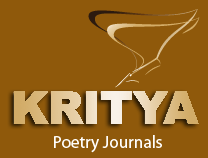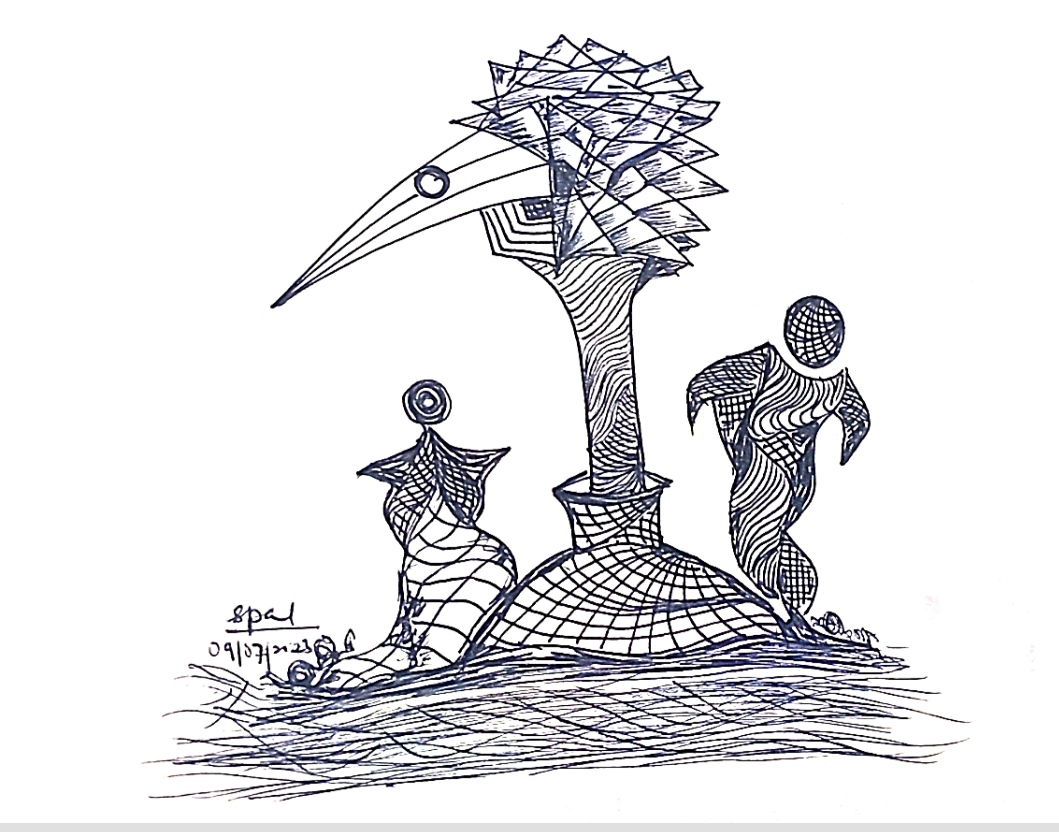
Poetry In Our Time
ALTYNAI TEMIROVA
KYRGYZSTAN
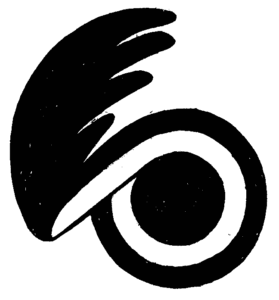
* * *
… Silently from the bottom of his heart
he was playing komuz the whole night!
Kinsmen were sitting around
to listen to melodies, they were quite lost
that they forgot that death was near…
Running his fingers across strums
he played komuz skilfully
prolonging life!..
What a talent!
Strings tuned imprisoned hearts!
They seemed to have escaped
A threatening terrible death…
Silently from the bottom of his heart
He was playing komuz the whole night!
* * *
Dreams are like life
And life is like dreams
For someone who doesn’t know who to trust,
suffering souls are filled with
happiness…
But like a cunning playful fox
attracting a hunter
A thousand of lies in life
keep you out of your way
persuading you
“It’s me, your happiness
Get from me whatever you like!”
Little by little
You keep threading your way,
Unable to give matters fresh thought.
Actually no one managed to do that…
* * *
The most tender feelings became strange.
A bullish mood turned quite strange.
What will happen to those who lost hope?
How do those who have lost their faith live?!.. –
I ask the Truth:
“Show me your face
Invisible for me and people!..
Where was it lost? Where is its place?”
It makes people’s blood boil,
that like daggers and swords
they may be drawn!
Air is full of noise and clamour…
The square and a white house
are hit by damaging floods
destroying everything on the way
What a pity, deeply
People became frustrated
That is the price we pay
For fate wrapped up in lies!
* * *
Above the black and white world
two “birds” fly
flapping their wings
and land
twittering…
They flutter their wings
They sing sweetly
and sincerely…
Above the black and white world…
The whole world
Every living being
forget about everything,
Filled with astonishment
listen to amazing sounds –
great elegance and charm
produced by delicate hands
on a great world of
white and black keys
of PIANO!
* * *
Dancing rain
Running out from somewhere
rain dances barefoot on asphalt
among houses and trees
pitter patter
pitter patter
The leaves and grasses all around
are swaying and singing
with all their might..
And the rain
with a thousand strands of long, fair hair
billowing from wind
rolling on the ground
keeps dancing
keeps dancing…
It is because of magic,
nature loses all control
and breaks out
in a sweat…
After a while, all of a sudden
it disappears from sight,
it continues its journey
dancing.
And clear raindrops
dancing along the road
are all kissed
by the wind …
* * *
The stream of river splashes water gently,
White foam tries to escape incessantly.
Mountain breeze kisses the stream
That runs singing round the clock
Pulling the willows on the bank.
Red plums are girls’ favorites.
They cast a shadow playing
With sunlight and breeze
Swaying back and forth
One can be startled with
a ravishing angel of the stream.
* * *
The White Palace, on the Aegean Sea,
Is really nice, clean, new and solid.
So excited and totally amazed
The sea loves it with respect.
Undying love is only for the Palace,
Does it worship holiness?!..
Nice, huge, massive, solid and
White pillars of which touch the sea!
It supports it, sighs heavily, moans and loves,
Its thousand-year-old secret is felt,
From this melodious sound,
Will the universe change?!..
* * *
LIFE
Like a deaf, blind and cruel
inquisitor of the times
and ages…
Life tortures people with all sorts of trials,
exposing to different tests
playing like a toy for its “jokes”…
All senses and colors of
whole our inner world
we’re wasting, for life
just to be able to say –
that we are here
to struggle for life…
On red and white string
of the Fate,
we threaded like rosary beads,
to the enigma,
and mystery
allure,
like tenderness of beauty
remaining enchanted…
Altynai Temirova 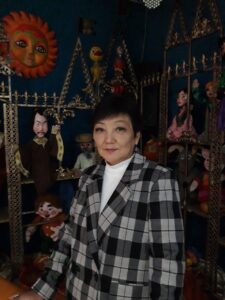 is a great kyrgyz poetess of a wide range, playwright and translator. She was born in 1960, in Aksy valley.
is a great kyrgyz poetess of a wide range, playwright and translator. She was born in 1960, in Aksy valley.
She began publishing with her poetry from 1980th. In 1990 graduated from the Institute of Literature named after M. Gorky in Moscow. Member of the Writers’ Union of the Kyrgyz Republic since 1991, International Pen Club since 2000, and Union of Cinematographers since 2014. She is a coordinator of Kyrgyzstan for “World Poets Movement” (WPM). Participant of the First worldwide Congress of WPM and Poetry Festival in Colombia and Venezuela (2023).
She was awarded the Rasul Gamzatov Special Prize. Laureate of the International Poetry Competition “Parnassus – Angelo La Vecchia Prize” (Italy, 2019).
In 2021, she received the State Prize of the Republic of Sakha-Yakutia (RF) “For contribution to Peace and Friendship of peoples” for cultural cooperation thanks to her excellent translations.
In 2015 and 2022 received the Golden Feather Award. She has Kyrgyzstan as a prominent member of Kyrgyz literature in several international festivals and won international awards.
A collection of poems was translated into German and published in Germany in 2022 and was awarded the Golden Diploma for achievements in literature.
Deep philosophy, authentic folk character, depth of images, historical direction, clarity, scope of the subject matter, unique aesthetics are characteristic of Altynai Temirova’s creativity and she stands out for her original style.
Altynai Temirova’s poetry was translated into German, Spanish, Russian, Bashkir, Finnish, Hindi, Chinese, Kazakh, Uzbek, Sakha-Yakut, English, Norwegian languages. Her poetries were published in foreign presses, books, almanacs and anthological collections.
She is an author of over ten books. Five dramas, four translations were performed on the stage of the main theaters of Kyrgyz republic, and two plays were included in the Golden Fund.
The modern “bilingual” poetess, known for her unique poems, was the first to be published in the Movement of Poets of the World magazine, which selects the best poetic works. Thanks to this, a great kyrgyz poet Altynai Temirova was able to raise modern Kyrgyz poetry to the world level.
Sunil Maloor
Translation by Arun T Vijayan
Sometimes,
Biju, Suresh, Madhu,
and even Sumangala
would join me as we set off along the riverbank,
heading into the forest to gather wild berries.
From amidst the pepper vines
clinging to the rugged trunk of an erythrina tree,
Ravi uncle would call out,
“Shouldn’t you kids be heading to school?”
We foresaw, in that long ago,
the fall of agriculture,
even his precious yams,
hunted by wild boars.
Biting into wild bananas,
tasting Hirsutus fruit,
we’d reach the forest
before the school’s first bell rang,
filling teak-leaf pouches
with clusters of berries.
We’d rise proudly atop the rock,
amidst blooming Mimusops flowers—
like Thrikkakkara Appan in a flower rangoli—
hearts pounding, climbing with a thrill.
Snake. Mongoose. Centipede. Eagle.
The mynah in the yard that Suresh noticed as he turned—
Teachers untrained in cluster meetings,
will came with their wisdom, filled in the wine basket.
Recently,
when I met Sumangala at a mourning gathering,
she said,
“Hey, since we couldn’t beat Lasagu*,
I’m off to join the employment guarantee scheme.”
In my mind, I spoke to her children,
who stood circling around her cheap sari.
“Even so, kids,
you must go to school,
and learn from the roadside.”
When the monsoon kids –
fall into the soil, which was
wounded by the narrow hoe,
Dad cuts the yam and
leaves it to dry in the mild sun
When the knife passed through the yam pieces,
my heart would blast
after dunking in liquid dung
the pith of the seed
sprinkles into a winnowing sieve.
That yam pieces, I dream of
containing in my lunchbox
feel itchy in the mild sun.
When I stare at the yam pieces
without controlling my desire,
Dad says with hope,-
that has grown up to the sky
more than a yam vine-
the bellies will fill after the harvest
When picking up the yam pieces from the store room
Dad’s strong arms will
spread the fragrance like vetiver
and the nursery kids will
laugh at his eyes
After serving the preserved seeds to the soil
he chews the pan of –
ardent spirit and local obscene words.
After all, in the dim light of the kerosene lamp
he sings an old theater song,
which has hopes to be rich in the next harvest.
During the season of poverty,
that song will be sung,
for lulling the children to sleep.
I would dream in my sleep,
Translation by Arun T Vijayan
After playing out the final scene
of the drama called Solitude,
when I returned home,
the children were waiting in the yard,
wrapping around my legs, calling,
“Appa!”
In the small mirror
stuck to the fridge door,
she took one last look,
smoothing stray strands of hair
with a hint of pride—
and, wrapping herself in that enthusiasm,
she followed me eagerly.
Even as I sipped tea,
nibbling on bits of home matters,
the solitude from the drama Solitude
hung thick around me,
like a dense mist.
The kids grabbed the phone,
diving deep into the sea of Candy Crush.
In the bedroom, she turned on the fan,
switched on the TV—
and, on the news,
a landslide swept over a village,
sleeping alone in its solitude.
Above the house,
the roar of solitude loomed,
casting off the costumes
of bustle worn beyond the stage,
all laid bare
beneath the hum of the washing machine.
I stepped into the bathroom,
scrubbing solitude with body wash,
rinsing it away.
The upper garment tore, stained with blood,
and the bathroom,
grew silent like an Amazon,
without the chirp of crickets,
a jungle of solitude thickening around me.
In the eye, the sunset sank,
and the legs waded into the river.
At the sound of a cry,
the house trembled in response.
Solitude is dead.
The crowd,
again and again, the crowd,
a play where all the audience
becomes the characters,
and with the ringing of the next bell,
the final death ritual concludes,
as rice lingers in the mouth.
A few months later
A piece of bone,
lying in the waters of Varkala,
drifting alone toward the south,
meets a cargo ship on its way.
It says, “Look there—
that’s not a shore,
that’s the stage,
a grand, vast theater.”
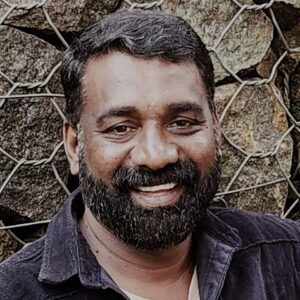 is a Malayalam poet and film maker. He was born and raised in Ranni, Pathanamthitta district, Kerala. He has published various poems in Malayalam periodicals. Two of his poetry collections — Masthiska Machi (published by Insight Books in 2011) and Pranayam Janadhipathyam Ennivayeppatti (by Pappathi Pusthakangal in 2022)— have also been published. He was received Lalithambika Antharjanam Award (2012), Nanma Kavitha Award (2023), Kurathiyadan Pradeep Smaraka Puraskaram (2023) and A.N Rajan Smaraka Puraskaram (2024).
is a Malayalam poet and film maker. He was born and raised in Ranni, Pathanamthitta district, Kerala. He has published various poems in Malayalam periodicals. Two of his poetry collections — Masthiska Machi (published by Insight Books in 2011) and Pranayam Janadhipathyam Ennivayeppatti (by Pappathi Pusthakangal in 2022)— have also been published. He was received Lalithambika Antharjanam Award (2012), Nanma Kavitha Award (2023), Kurathiyadan Pradeep Smaraka Puraskaram (2023) and A.N Rajan Smaraka Puraskaram (2024).Burgess Needle
“The Last Green Blink”
My fever arrived with morning sun and the sight
of stiff ants piled on DDT drifts.
Through a thousand cotton frames
my mosquito net revealed monks,
their shaven heads glistening, being drawn
out by the great gong’s reverberation.
I considered the hard guavas hanging outside.
More saffron robed monks, shielded
from the sun by black umbrellas, glided by.
I worshipped the beauty of that orange-black
butterfly settling near my honeyed tea.
Every pore of my skin exuded moisture.
My eyes, nearly heated shut, imagined
colored wings fanning me cool.
I trapped the fragile
orange-black whisper under a clear glass
still pulsing there!
Soon the great gong sent a sound wave
from the monastery that passed through
All matter and even brushed lovers at dusk
as a halo to their embrace.
The still-dry folds of my sheet resembled
the whiteness of oblivion.
Buddha sought distance from desire.
Even the sweet grasp of sex becomes chaffing.
Regret nothing, but I regret this bed,
my heated skin and my most recent act
against orange-black.
Was it able to see the hanging guavas?
A pillow cushioned my head –
I imagined being orange-black,
sipping honeyed tea.
In my dream state, bedded down with rolled up eyes,
I recall flying over trees in a pressurized cabin, barely
an inch of steel separating my skin
from earth’s sweet breath.
Trees rustled children cried
I yanked the glass away, freeing a winged soul.
I (orange-black “i”) was finer than the thinnest capillary.
I (orange-black “i”) wondered was it time to kiss
the killing-dust and lie with ants,
I who had become a motion
between earth and sky.
Once again, the gong’s great reverberation came
and brazed prayers and screams as one,
called the monks back to the monastery,
called me out of the air
sending orange-black
into itself and myself back to a bed
where I (merely human again)
cried in cruel memory of lost flight.
My next incarnation shall find me eager
to touch the stars and rub against the moon
until polished hard as any glass, I emerge
able to absorb the world before me
all the way to the last green blink of the horizon.
“The Monkey Saw
Only the Food”
Teak floorboards of Sanguan’s home gleamed
hours of coconut husks rubbed them bright
every day in Paak Waan – which meant “Sweet Vegetable,”
the name of his town.
Inside, he saw an emaciated crone curled
In a corner of the room, smiling,
revealing betel nut-colored gums
a drool of red by her chin.
My camera’s aperture widened – absorbed all.
Sanguan hacked a coconut open
sweet, cool liquid for my parched
throat. Brando posters on the wall.
Breaking through a palm leaf roof,
sunlight curled Playboy covers,
careened off Sanguan’s buckle.
The woman’s slitted eyes glittered.
Sanguan grasped my little finger, drew
me close to her, skin and bones,
quivering, she appeared delirious.
Palms pressed together, he bowed
in her direction as a maroon spider
lowered itself, leg over leg, closer.
“I have to go home,” I said.
The spider, barely an inch away, paused in air.
Whispering, Sanguan urged, “Be polite. Greet
my mother. You are her first foreigner!”
Outside, on a cracked, wooden platform,
Sanguan’s aunts and nephews fed
a pet monkey, which saw only the food.
The people saw only the monkey.
The camera saw only shadows formed
by the brilliant Thai sun
that illuminated everything.
“Linked”
While the sun warmed another side of the planet
we clutche chilled fingers on a high New York meadow
thousands of us perched on folding chairs, amped
up for the great Grey Fox Bluegrass Festival to which
the cattle would later return, ignore the flattened grass
and ruminate on the echo of banjos over hot manure.
Sloping down our line-of-sight the musicians emerged
instruments in place: guitar, banjo
mandolin and fiddle* already tuned
As we were tuned – had been tuned
so many decades to be there, chilled,
on that meadow as we’d been by the
Charles River back when a mandolin player
warmed his fingers over the flame
of a stove’s gas light, well before his
PhD in organic chemistry.
What a dense and mighty flux
is Time and our seat on its surface.
A Chinese emperor some millennium gone
gestured one soft evening
(the fine silk of his robe barely
folding with his movement)
A passing acknowledgement of the sight
above lighter-than-air lanterns
of balsa wood and fine paper aloft
glowing through calligraphic lettering
by one slim candle-
All that floating whisper of pink light
hovering above his majesty
beneath the same sun the same moon
As we two so many years later, on the dewed grass
Of some borrowed farm land –
we, the emperor, that long-ago mandolinist.
By China’s southern shore women’s
voices arose from locked quarters
as musical scales distinct from
our own as an elegant trogon’s
hue from an ordinary dove-
Linked were we are we
by this fragile, magical web called music.
Then, the fiddler, prancing in shoes aflame,
flung about his incendiary notes
as high above paper lanterns floated
with their own heat as our past licked
and blew hot breath on our present –
our frozen-in-time life we hold so dear.
*The band that evening was THE STEEP CANYON RANGERS with
Nicky Sanders – Fiddle; Mike Guggino – Mandolin; Woody Platt – Guitar;
Graham Sharp – Banjo; Charles Humphrey III – Bass
and Mike Ashworth – Percussion.
Burgess Needle’s 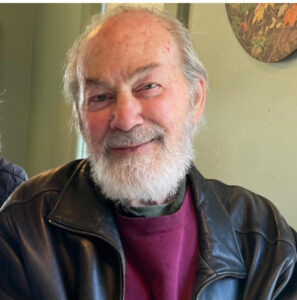 poetry has appeared in: Blackbox Manifold (UK), Boston Literary Magazine, Blue Lake Review and The Galway Review (Ire.) He taught English for two years in a Thai village from 1967 to 1969. He was a school librarian in Tucson for 35 years. His memoir, Sit and Cry: two Years in the Land of Smiles, was published in 2018. He is writing a novel and lives in Vermont with a hazel eyed woman of wit, charm and beauty.
poetry has appeared in: Blackbox Manifold (UK), Boston Literary Magazine, Blue Lake Review and The Galway Review (Ire.) He taught English for two years in a Thai village from 1967 to 1969. He was a school librarian in Tucson for 35 years. His memoir, Sit and Cry: two Years in the Land of Smiles, was published in 2018. He is writing a novel and lives in Vermont with a hazel eyed woman of wit, charm and beauty.
